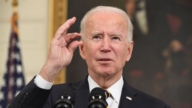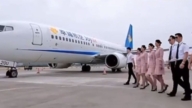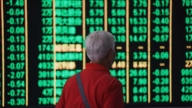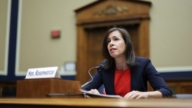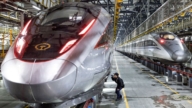【新唐人2013年06月20日訊】目前,中國大陸經濟不斷下滑,社會危機日益加深。為此,國務院總理李克強提出:打造「中國經濟升級版」,試圖通過拉動經濟增長來緩解執政危機。但香港媒體認為,當前大陸經濟面臨5大風險,形勢越發嚴峻。專家也指出,中共高層雖然嚐試化解風險,但實際上,中國經濟已經在「硬著陸」之中。
早前,中共總書記習近平在和美國總統歐巴馬會面時曾經表態,中國經濟風險總體上仍然可控。國務院總理李克強也曾提出:打造「中國經濟升級版」,試圖通過改革來拉動經濟增長。
香港《經濟日報》分析,中國大陸經濟風險重重,中共中央是否還有機會和時間,通過經濟增速來緩解社會壓力、換取經濟升級,這本身還是個問號。
報導指出,當前大陸經濟歸納起來,至少面臨5大風險,包括:就業壓力、地方債務、影子銀行、樓市泡沫和利益集團。其中,地方債務、和影子銀行等金融風險已亮起紅燈。早前三大國際評級機構一齊下調中國評級,對中國式「影子銀行」和地方債風險發出警告。
6月18號,評級機構「惠譽國際(Fitch Group)」表示,中國正面臨至少7年來最嚴重的錢荒,影子銀行已出問題,銀行危機可能提前爆發。上個月底,國際貨幣基金組織(IMF)也曾指出,中國地方政府債務已經佔到GDP的50%。
北京天則經濟研究所副所長馮興元:「但實際上我們自己的計算結果是遠遠高於這個(IMF評估)的。今年是還債高峰,明年也是,後年可能更高。最近出現國債賣不完,那是重大事件。」
北京「天則經濟研究所」副所長馮興元,還向《新唐人》分析了「國債發行不出去」的深層原因。
馮興元:「那說明社會上現在資金外逃可能比較嚴重、真正能用的資金比較緊張。第二個可能是,對政府債務比較怵。」
根據統計局公布的5月份全中國大中城市房價數據,顯示,房價高燒不退,樓市泡沫加大。同時,大批企業經營困難,就業壓力明顯加劇,今年被稱為「史上最難就業年」。據說,嚴峻的就業形勢已迫使習、李親自過問。
另外,17號,國防部徵兵辦公室對外表示,今年的徵兵時間由冬季調整到夏秋季。以大學生入伍優先,並享有各種優惠政策。
對此,大陸企業觀察人士何軍樵分析指出,當局是為了緩解大學生就業壓力。但這一舉措並不被看好。
大陸企業觀察人士何軍樵:「即使去徵兵,有多少大學生願意去從事軍人這一行業呢?這個報導應該說從另一個方面反映了:中國目前的就業形勢是非常嚴峻的。」
港媒則報導說,有接近決策層的官方智囊指出,近期的相關數據顯示,中國經濟可能二次探底,中共中央也意識到經濟形勢嚴峻。
何軍樵:「甚麼叫做二次探底呀?我覺得中國經濟是不是探底了,我現在還表示懷疑。恐怕這個底比你我想像的還要更深一點。如果說硬著陸的指標就是經濟崩潰,那這個指標未免也定的太高了一些。中國經濟我認為已經是在硬著陸了。」
何軍樵強調,中國的經濟命脈掌握在利益集團手裡,這個集團自然不願放棄自身利益、進行經濟變革。何軍樵同時指出,中國的經濟問題實質上反映的是政治問題,這絕不是靠技術和技術官僚可以解決。目前當局的舉措都是治標不治本,等病情一旦惡化之後,將一發不可收拾。
採訪/易如 編輯/李謙 後製/葛雷
HK Media: 5 Major Risks Facing Chinese Economy
China’s economy is continuing to decline and
social turmoil deepens.
Premier Li Keqiang announced plans to build
“an upgraded version of the Chinese economy”,
trying to stimulate economic growth to ease the ruling crisis.
But Hong Kong media have pointed out that
there are currently five major risks facing the mainland
economy have made the situation even more grim.
Experts also pointed out that the Chinese Communist Party
(CCP) leadership are attempting to resolve the risks,
but China’s economy has already reached the “hard landing”.
During the meeting of General Secretary Xi Jinping and
U.S. President Obama, Xi said, that
the overall risk for the Chinese economy
is still controllable.
Premier Li Keqiang has proposed to build “an
upgraded version of the Chinese economy”,
trying to stimulate economic
growth through reforms.
Economic Times in Hong Kong analysis is that
the China’s economy is at risk.
Whether there is opportunity and enough time left
for the CCP’s Central Committee
to ease social tensions through economic growth,
in exchange for economic upgrading, it is still in question.
It is reported that the current mainland economy
is facing at least five major risks.
These major risks include employment pressure, local debt,
shadow banking, the housing bubble and interest groups.
Among them, the local debts, shadow banks and
other financial risks have raised alarm.
Some time ago, three major international rating
agencies together lowered China’s rating,
and warned about Chinese-style shadow banking
and local debt risks.
On June 18, the rating agency Fitch Group said China is facing
its most severe money shortage in at least the past seven years.
The shadow banking has run into problems,
And a banking crisis could quickly erupt.
In late May, International Monetary Fund (IMF) has pointed
out that Chinese local debt accounts for 50% of GDP.
Feng Xingyuan, deputy director of Beijing Institute of
Economics: “Our own calculations are much higher than this (IMF assessment).
This year is the debt peak, so is next year,
and the year after next may be even higher.
Unsold bonds appearing recently
is a significant indicator.”
Feng Xingyuan also analyzed the underlying causes of
unsold national debts.
Feng Xingyuan: “It indicates that in our society,
there are serious quantities of capital flowing overseas, and that real money is scarce.
A second possibility is the relative risks of government debt.”
According to Chinese cities housing data
announced in May by Bureau of Statistics,
it shows that house prices continue to be high,
and the property bubble is growing.
Meanwhile, a large number of business have difficulties,
and the employment pressure has increased significantly.
2013 is called “the most difficult year
for employment in history”.
It is said that the severe employment situation
has forced Xi and Li to intervene personally.
In addition, on June 17, the recruitment office
of the Defense Department announced that
the conscription time this year had been adjusted
from winter to summer and autumn.
College students have priority in recruitment, and
enjoy various preferential treatment and policies.
In this regard, mainland enterprises observer
He Junqiao pointed out that
the CCP is trying to ease the employment pressure.
But these measures are not optimistic.
He Junqiao, said, “Even for conscription, how many
college students are willing to enter the military?
This report reflects from the other side that
China’s current employment situation is very grim.”
Hong Kong media then reported that there are official think
tank members close to the decision-making level
that the recent data indicates that China’s
economy may have double dipped,
and the CCP Central Committee is also aware of
this grim economic reality.
He Junqiao; “What is a double dip? I think the Chinese
economy has not reached bottom, but I’m still skeptical.
I’m afraid this bottom would be a little deeper
than we thought.
If the indicator for a hard landing is economic collapse,
this indicator is set up too high.
The Chinese economy, I think is already in hard landing.”
He Junqiao stressed that China’s economic lifeline
rests in the hands of interest groups,
who are naturally reluctant to give up their own
interests for economic reforms.
He Junqiao also pointed out that China’s economic
problems are essentially reflecting the political problems, which is never a mere technical issue.
Current initiatives are only stopgap measures, and
once the situation deteriorates, they will not work.




